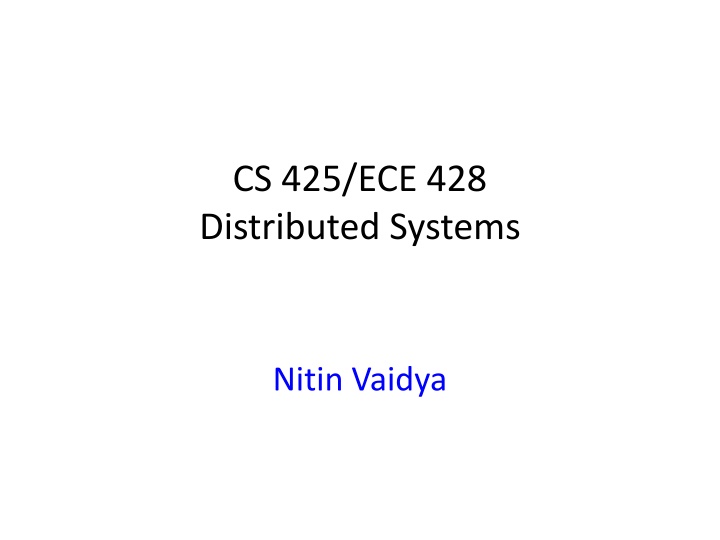
Distributed Systems - Overview, Applications, and Concepts
Explore the world of distributed systems with insights on course handouts, mid-term exams, lectures, and the fundamentals of distributed computing. Discover the differences between parallel and distributed computing, the role of uncertainty in distributed systems, and more.
Download Presentation

Please find below an Image/Link to download the presentation.
The content on the website is provided AS IS for your information and personal use only. It may not be sold, licensed, or shared on other websites without obtaining consent from the author. If you encounter any issues during the download, it is possible that the publisher has removed the file from their server.
You are allowed to download the files provided on this website for personal or commercial use, subject to the condition that they are used lawfully. All files are the property of their respective owners.
The content on the website is provided AS IS for your information and personal use only. It may not be sold, licensed, or shared on other websites without obtaining consent from the author.
E N D
Presentation Transcript
CS 425/ECE 428 Distributed Systems Nitin Vaidya
T.A.s Persia Aziz Frederick Douglas Su Du Yixiao Lin
Course handout textbook office hours Piazza grading policy late submission policy
Course website mid-term exam schedule lectures page homework programming assignments (for 4 credit hours only)
As you can see, I have memorized this utterly useless piece of information long enough to pass a test question. I now intend to forget it forever. You ve taught me nothing except how to cynically manipulate the system. - ??????
Calvin and Hobbes As you can see, I have memorized this utterly useless piece of information long enough to pass a test question. I now intend to forget it forever. You ve taught me nothing except how to cynically manipulate the system. - Calvin
Handout provided for 1st mid-term in Spring 2014 something similar this semester too
What is distributed computing? Parallel computing versus distributed computing Example: To add N numbers where N very large use 4 processors, each adding up N/4, then add the 4 partial sums Parallel or distributed ?
What is distributed computing? Parallel computing versus distributed computing Role of uncertainty in distributed systems Clock drift Network delays Network losses Asynchrony Failures
A distributed system is one in which the failure of a computer you didn't even know existed can render your own computer unusable. -- Leslie Lamport
What is distributed computing? Parallel computing versus distributed computing Role of uncertainty in distributed systems Clock drift Network delays Network losses Asynchrony Failures
Clocks Notion of time very useful in real life, and so it is in distributed systems Example Submit programming assignment by e-mail by 11:59 pm Monday By which clock ?
How to synchronize clocks? Role of delay uncertainty
Ordering of Events If we can t have perfectly synchronized clocks, can we still determine what happened first?
What is distributed computing? Parallel computing versus distributed computing Role of uncertainty in distributed systems Clock drift Network delays Network losses Asynchrony Failures
Mutual Exclusion We want only one person to speak Only the person holding the microphone may speak Must acquire microphone before speaking
Mutual Exclusion How to implement in a message-passing system?
Mutual Exclusion What if messages may be lost?
What is distributed computing? Parallel computing versus distributed computing Role of uncertainty in distributed systems Clock drift Network delays Network losses Asynchrony Failures
Agreement Where to meet for dinner?
Agreement with Failure Non-faulty nodes must agree
Agreement with Crash Failure & Asynchrony
What if nodes misbehave? Crash failures are benign Other extreme Byzantine failures
Agreement with Byzantine failures (synchronous system)
How to improve system availability? Potentially large network delays network partition Failures
Replication is a common approach Consider a storage system If data stored only in one place, far away user will incur significant access delay Store data in multiple replicas, Clients prefer to access closest replica
Replicated Storage How to keep replicas consistent ? What does consistent really mean?
Learn to reason about distributed systems not just facts, but principles Learn important canonical problems, and some solutions Programming experience
In class: we will focus on principles Supplemental readings: read about practical aspects, recent industry deployments
Distributed Computing our scope Communication models: message passing shared memory Timing models: synchronous Asynchronous Fault models Crash Byzantine 35
Shared Memory Different processes (or threads of execution) can communicate by writing to/reading from (physically) shared memory
Distributed Shared Memory The shared memory may be simulated by using local memory of different processors
Consistency Model Since shared memory may be accessed by different processes concurrently, we need to define how the updates are observed by the processes Consistency model captures these requirements
Consistency #1 Alice: My cat was hit by a car. Alice: But luckily she is fine. What should Calvin observe? Bob: That s great!
Consistency #1 Alice: My cat was hit by a car. Alice: But luckily she is fine. What should Calvin observe? Bob: That s great!
Consistency #2 Alice: My cat was hit by a car. Alice: But luckily she is fine. Bob: That s terrible! What should Calvin observe?
Consistency #2 Alice: My cat was hit by a car. Alice: But luckily she is fine. Bob: That s terrible! What should Calvin observe?
